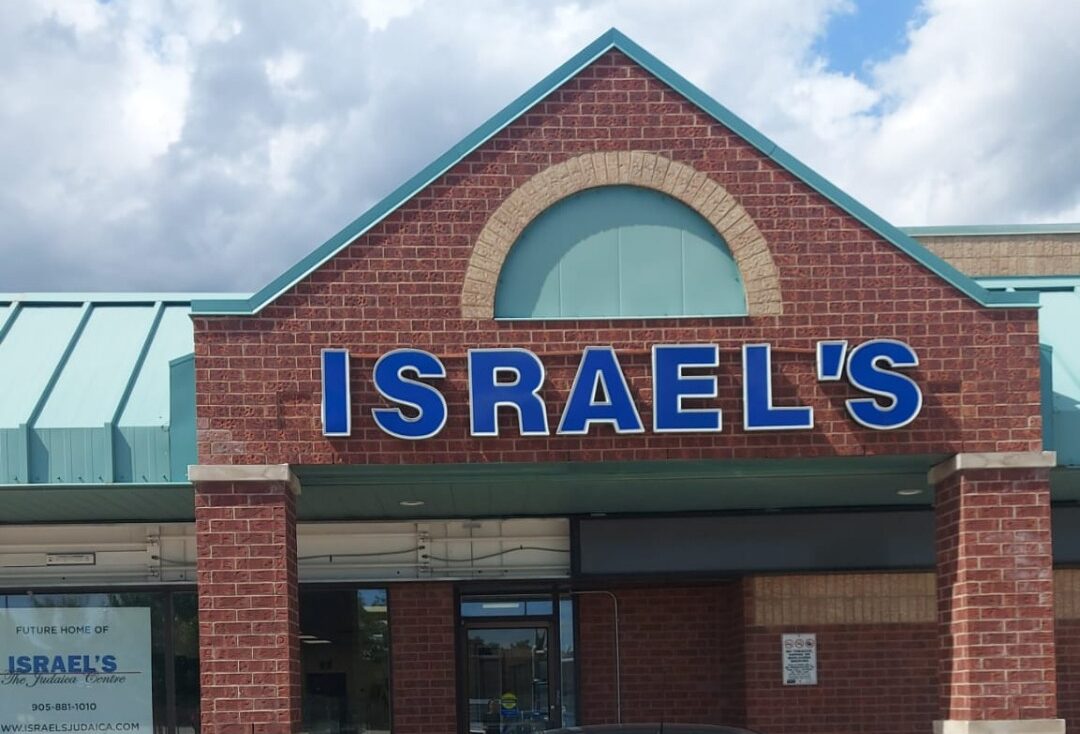Shopping
Israel’s Judaica Centre closed its doors after 42 years in Toronto due to a retail climate that makes it difficult for a small store to survive

Lisa Rabin arrived in Toronto from Cape Town in 1995 without knowing much about Judaism. She hadn’t grown up religious but, at age 23, she wanted a few items in her new home that reflected her heritage.
Rabin decided to visit Israel’s Judaica Centre, which had a location in a plaza on Clark Street in Thornhill. She felt self-conscious about wearing pants, rather than a skirt, in a religious Jewish setting—but she went inside anyway.
“To walk into a store like Israel’s was a really special experience,” Rabin says. “It was warm, it was fuzzy. You wanted to explore more [about] what it was to be Jewish.”
Immediately, someone came to help Rabin. She admitted she didn’t know much, but this friendly staffer recommended she start with a pair of candlesticks to light on Shabbat. The employee not only pointed her toward a pair of silver candlesticks with a gold outline of Jerusalem, but explained the tradition, and showed Rabin how to do it.
Rabin still has those candlesticks today.
“They’re very precious because they signify all the good stuff that has happened over the years. It all started from Israel’s,” she says. “From there on, it was always my go-to place whenever I needed something.”
But on May 31, Rabin can no longer return to her beloved Israel’s. After 42 years in business, the retailer has permanently closed its doors.
Israel’s already closed its location on Eglinton Avenue in midtown Toronto—where it occupied several different addresses over the decades—amidst the “double whammy” of the pandemic and the extended timeline for construction of the Eglinton LRT, according to owner Jodi Segal.

The store then downsized even more in 2023 due to the surge in online shopping. Though Israel’s has an e-commerce website, it didn’t remain popular after COVID. Last summer, the store left its Clark Avenue location for a smaller site on Centre Street.
“I’ve put as much as I can into the business,” Segal says. “It’s time to move on.”
Segal started working as a wholesale manager for the store’s original owner, Israel (Izzy) Kaplan, in 1984. He managed two locations and a book warehouse. Segal eventually took ownership in 2013 when Kaplan’s wife, Susie, decided to make aliyah.
“I felt that it still played a vital role in the community,” Segal says. “That’s why I took it over. I wanted to carry it on.”
Segal remembers Israel’s as a “hub” for the Jewish community in the 1980s and ‘90s. He describes every Sunday as packed: rabbis would browse the store for scholarly texts, bibliophiles would search for Yiddish translations and many would also pick up a copy of the New York Times on their way out.

As the millennium arrived, Israel’s faced more competition. It used to be one of the few places to find Jewish books and gifts in Canada, even shipping gifts and books to synagogues from Halifax to Victoria.
Then, big-box retailers started stocking more of these products, and people went to those locations instead. As the 2000s progressed, the internet became a place to buy books and compact discs. Eventually, the CDs became obsolete, e-books took over, and consumers no longer needed as many physical items.
Segal watched Israel’s inventory shrink. The racks of audio and video disappeared. The books that he so carefully selected became a smaller part of their sales. In the 1980s and ‘90s, he estimates that Israel’s sales consisted of 60 percent books, 40 percent gifts and Judaica. But in the age of Amazon, book sales ultimately represented just 20 percent of the total.

Segal says that wholesale customers, such as the Reform and Conservative supplementary schools, also started buying their textbooks online.
It wasn’t just Israel’s struggling. Larger retailers, such as Nordstrom and Target, couldn’t keep their doors open in Canada after trying to replicate their success in the U.S. Indigo, one of the largest competitors for Israel’s book business, also increased its sales of non-book items in the effort to return to profitability before a recent return to private ownership.
“Brick-and-mortar stores across the board are not faring as well as they once did,” says Israel’s manager and buyer, Sarah Zeldman-Novak. “This being a particular niche, you get hit even more.”
But unlike the big stores, Segal and Zeldman-Novak are most bereft by the community they’re leaving behind when Israel’s shutters.
Zeldman-Novak started working at Israel’s in 1994 and has worked there for most of her adult life. She watched two different couples, now married, meet while working at the store together. She has seen many customers come in for a bar mitzvah tallit, then a wedding tallit, then a son’s bris pillow.
“People share that with you, so that’s what really makes it a community store,” Zeldman-Novak says.
It was also a place where people could learn about Judaism, no matter their background. Most of the Israel’s staff identify as traditional, but will help customers find anything they’re looking for—ranging from a feminist haggadah to the collected thoughts of Moses ben Nachman, the Ramban.
“Izzy Kaplan created Israel’s [because] he wanted it to be an open door to anyone interested in Judaism,” Segal says.

Zeldman-Novak tears up talking about her most memorable customers, many of whom she plans to stay in touch with after the store closes. She says that one of these customers is a non-Jewish couple who live on a ranch in British Columbia. They’re very interested in Judaism, and Zeldman-Novak has been curating and shipping religious texts and Jewish books to them for years.
The couple won’t leave their ranch, which makes it difficult for them to convert. But because of their learning through Israel’s, they ordered a sefer Torah from Israel’s.
“You can come in here from any walk of life,” Zeldman-Novak says. “You can get some information and be comfortable asking your questions.”

Rabin herself has no idea what she’s going to do without Israel’s. When she came into the store in mid-May, Segal pulled her aside to tell her about the closure.
“I was so upset!” she says. “It’s going to be a big void in the community.”
Segal and Zeldman-Novak are both sad to be moving on, but emphasize how grateful they are to have kept Israel’s in business for so long.
Segal plans to retire and spend more time volunteering, studying and visiting family and friends. Zeldman-Novak isn’t sure about her next move, but thinks that she might keep working in the Judaica business.
“There wasn’t a place quite like Israel’s,” Segal says. “I trust that somebody’s going to take up the slack. That’s what I’m hoping.”









